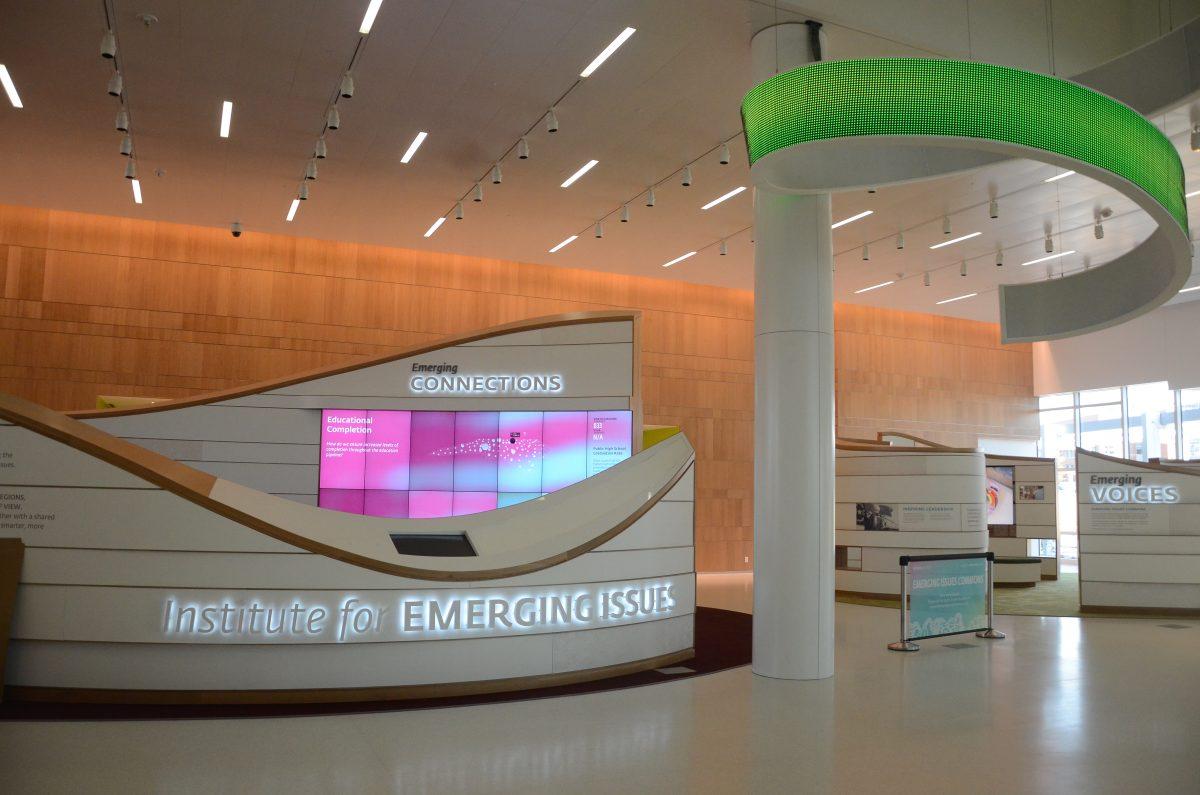Former Gov. Jim Hunt and Chancellor Randy Woodson sat together minutes before a speech on the importance of manufacturing in North Carolina. Though specifics of the conversation are unknown to us, it wouldn’t be a stretch to say the conversation pertained to how N.C. State could benefit from a more industrialized economy.
Hunt, an N.C. State alumnus, donned a Wolfpack tie during the 28th Emerging Issues Forum Monday, a discussion series he started as governor. Business leaders, academics and politicians gathered in the Raleigh Convention Center to discuss local manufacturing.
The Institute for Emerging Issues, a North Carolina policy think tank based out of N.C. State, hosts the event, which will conclude today. Hunt founded the Institute in 2002, and like the forum series he started in 1986, the organization aims to facilitate collaboration between industry, government and academia to “tackle critical issues and to build North Carolina,” according to Hunt.
“We call it a think — and do — institute,” Hunt said.
Rebranding manufacturing as a high-tech and modern industry prevailed as a common theme among the 25 individual speeches.
“We’re talking about the next generation of manufacturing,” Hunt said. “The big textile mills we used to have — gone. We’re here to look at the future.”
North Carolina ranks third in the United States in manufacturing production, according to the Institute, and growth in the sector comes from new industries like pharmaceuticals, biotechnology, energy production and aerospace engineering.
The future economy Hunt alluded to will need a workforce to employ, and Woodson, a forthright upholder of N.C. State as an engineering school, introduced the forum.
“Manufacturing has always been a cornerstone of North Carolina’s economy,” Woodson said. “Throughout our history, N.C State has remained steadfast in our commitment to providing the education and research needed to drive manufacturing forward.”
After the economic crisis of 2008, North Carolina lost 115,000 manufacturing jobs and has only recovered 11,000, according to Dow Chemical Co. CEO Andrew Liveris. Despite job losses, Liveris, a keynote speaker, said North Carolina is redefining the manufacturing industry.
“Here in North Carolina, manufacturing of a different sort is taking hold, and the sector and the public’s opinion are changing, and they’re on the upswing,” Liveris said.
Liveris, who Business Insider named No. 7 of the 25 most-overpaid CEOs in 2010, calls himself an evangelist for manufacturing and said North Carolina gets manufacturing right.
“We have a stark chance to drive a manufacturing renaissance,” Liveris said. “We need jobs that can create widespread wealth.”
Liveris acts as a spokesman for manufacturing in his book Make It in America and as poster child of widespread wealth, too. He earned $16.3 million in 2010, according to Business Insider.
Liveris and Tom Kurfess, a professor of automotive engineering at Clemson University, laid out similar points to keep manufacturing successful in the United States in their panel discussions. Both said the nation must enable innovation by investing in human capital by training 135,000 more STEM graduates annually, changing the business climate by cutting corporate taxes and introducing a territorial tax system, and streamlining regulation.
“We need a system where hard work pays off, and responsibility is rewarded,” said Kurfess, who is finishing a year of serving in the White House Office of Science and Technology Policy.
Many speakers of the day touched on educating and training the youth for an industrialized future, and though business executives in suits and university officials consisted of much of the crowd, all freshmen students in the Park Scholar program were required to attend.
“This event is all about exposure,” Sidhartha Jandhyala, a freshman in biomedical engineering, said. “Governor Hunt is a friend of the Park Scholars, and I’m excited to see what the issues are about.”
Jandhyala said attending the forum was a privilege, and missing class for two days to attend the event for free is a deal: University officials paid $275 to attend, while outside participants paid $400.
The forum will continue today from 8 a.m. to 2 p.m. Hunt said he thinks the forum improves every year.
“New things are happening, and we’re going to learn about them and their amazing potential,” Hunt said.
Woodson said he is eager to see N.C. State seize the potential Hunt referred to, and with the same attitude he had when he entered his office, he plugged the University’s highly technical programs.
“It’s all about a public-private partnership,” Woodson said. “We’re ready to support [manufacturing], have our students embrace it and move North Carolina forward. We can’t be successful if we can’t keep building things.”








